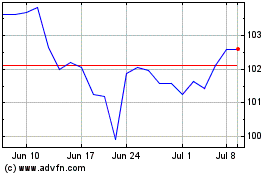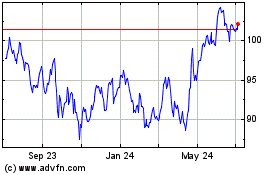Cannabis ETFs Aren't the Same -- Journal Report
July 08 2019 - 10:33PM
Dow Jones News
By Simon Constable
A burning desire for pot stocks may leave unwary cannabis
investors with more speculative investments than they realize.
Take two exchange-traded funds focused on the cannabis industry:
ETFMG Alternative Harvest (MJ) and the recently launched
AdvisorShares Pure Cannabis (YOLO). While they both purport to
track the same industry, they are actually quite different.
"One is much broader and expansive; the other one is at the
extreme end of what is already extreme," says Ben Johnson, director
of global ETF research at Morningstar. "Less than half of their
holdings are common across the two portfolios."
More specifically, the Alternative Harvest (AH) fund includes
companies that will indirectly prosper from the cannabis industry,
such as plant-food firm Scotts Miracle-Gro and tobacco companies
such as Philip Morris International. Both are leaders in their
fields and could quickly profit from the burgeoning marijuana
business.
"We want to own everything in the space because trying to pick
winners is extremely difficult," says Chris Yeagley, managing
partner of Prime Indexes -- the index provider for the AH fund. He
likens it to investing in the 1848-1855 California gold rush, where
some miners did well, but so did the sellers of picks and shovels,
the tools required for mining.
The Pure Cannabis (PC) fund, meanwhile, focuses on more direct
beneficiaries of the industry such as WeedMD, which is a federally
licensed grower and distributor of medical-grade cannabis, and
Charlotte's Web Holding, which makes and distributes hemp-derived
cannabidiol (or CBD) wellness products.
"The Pure Cannabis fund goes much further down the market-cap
spectrum into microcap," says Mr. Johnson. In other words, the
stocks are tiny.
This different focus also means that the PC fund has more
speculative securities than the Alternative Harvest fund. For
instance, as of July 2, Pure Cannabis had a mere four stocks in its
top 25 holdings that had earnings, according to data from
Morningstar. That compares to 14 of the top 25 holdings for the
Alternative Harvest ETF. Note that the PC fund is actively managed,
while the AH fund tracks an index.
Having unprofitable firms in funds can be a red flag, some
experts say.
"There is greater risk in investing in a portfolio of companies
where profitability doesn't exist and where you are investing on
potential," says Todd Rosenbluth, senior director of ETF and
mutual-fund research at New York-based CFRA.
Dan Ahrens, the Dallas-based portfolio manager of the Pure
Cannabis ETF, says he isn't worried about the lack of net income
from the companies in the fund's holdings. "Old-fashioned analysis
doesn't work for these startups," he says. "Instead we want to know
that they are reinvesting on future production and scaling up
capacity."
He also notes that while the ETF invests in startups, it doesn't
"invest in Bobby on the street corner; these stocks are listed on
the Nasdaq, NYSE and the Toronto exchanges, not the more
speculative pink-sheets," he says.
The two ETFs are similar in at least one way: Annual fees are
0.75% for the Alternative Harvest fund and 0.74% for the Pure
Cannabis fund.
Mr. Constable is a writer in Edinburgh, Scotland. He can be
reached at reports@wsj.com.
(END) Dow Jones Newswires
July 08, 2019 22:18 ET (02:18 GMT)
Copyright (c) 2019 Dow Jones & Company, Inc.
Philip Morris (NYSE:PM)
Historical Stock Chart
From Mar 2024 to Apr 2024

Philip Morris (NYSE:PM)
Historical Stock Chart
From Apr 2023 to Apr 2024
